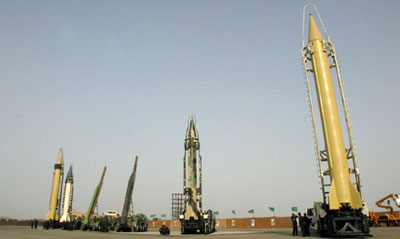Are Iranian nukes inevitable?by Taylor Dinerman
|
| Iran’s proclaimed desire to launch a satellite sometime this year seems to indicate that they see their rockets as something more than just glorified Scuds. |
The evidence that Iran is trying to build a bomb is not based on CIA assets or on reports from so-called “friendly” intelligence services, but on data reluctantly disclosed by the UN International Atomic Energy Agency (IAEA). These constant and repeated violations of the Non-Proliferation Treaty do not much bother Monsieur Boucheron. He figures that the treaty should be adapted more towards preventing nuclear materials from getting into the hand of terrorists than towards preventing the spread of nuclear weapons. He says it quite plainly: “L’Iran veut la bombe, l’Iran aura la bombe.” (Iran wants the bomb, Iran will get the bomb.) He may be right, but the next time France asks anyone to take so called “international law” seriously, one can point to their lax attitude towards Iran.
Boucheron implies that he looks forward to a nuclear Iran, as a way of inflicting damage on the US and on its efforts to bring democracy to the Middle East. Whatever Chirac says, no French politician is comfortable with the idea that democracy in the Middle East will negate forty years of networking and influence building with the corrupt and tyrannical regimes accomplished under their “politique arabe.” The Iranians are, of course, not Arabs, but they are part of what France has long hoped would be its “sphere of influence” in the Middle East. This may be part of the reason why France has this traditionally relaxed attitude towards nuclear proliferation, but it goes deeper than that.
France’s attitude towards nuclear weapons is, for a Western country, unique. The US and the UK look upon nuclear weapons essentially as tools, horrible and dangerous tools, but certainly not proof of national greatness. India, Russia, and China are tending towards a similar attitude. The only declared nuclear power that holds these weapons in the same quasi-mystical awe as France is Pakistan. There are good historical and cultural reasons for this, and the US has often failed to recognize them. France’s nuclear ambitions were fulfilled by DeGaulle, who made them into symbols of redemption after the trauma of the lost Algerian war. This attitude actually helped the US in the 1980s, when France was the only major European state without an anti-nuclear movement.
It is this attitude, rather than any well-thought-out doctrine, that leads France’s elites to smile upon the phenomena of nuclear proliferation. Where the US sees danger, they see stability and, not coincidentally, the diminution of US power. They are reasonably sure that neither Paris nor French troops will be the targets of any rogue state bombs. No points for guessing whom they would like to see hit with such weapons.
| The answer is not some new and equally useless treaty, but is, in part, a set of US weapons in orbit that can not only destroy enemy missiles in the boost phase. |
Iran’s project to develop nuclear weapons and the long-range missiles that will carry them is supposed to be countered by Britain, Germany, and France, working diplomatically. Reports from Bush’s European trip indicate that these nations have promised that, if they fail, they will allow the US to refer the problem to the UN Security Council. If such promises have been made, the administration would be foolish to believe them. They were fooled before, in the run-up to the Iraq war. By now, they should recognize that European diplomacy, under these circumstances, is contemptible nonsense.
The Clinton Administration’s experience with North Korea is perfectly relevant here. In 1993 and 1994 they negotiated in good faith with Pyongyang and were taken to the cleaners. Japan at least has learned not to trust the soothing music associated with multilateral diplomacy. Their decision to support US missile defense efforts is strong evidence of this new orientation. No one should be surprised if Russia follows suit. France, Germany, and the UK may find themselves isolated as the last believers in the credibility of the mullahs.
Faced with a world in which proliferation is becoming a reality, Bucheron is right to point out that the Non-Proliferation Treaty is obsolete. The answer is not some new and equally useless treaty, but is, in part, a set of US weapons in orbit that can not only destroy enemy missiles in the boost phase, as well as others that can strike targets deep underground. There is also a real need for the US and its friends to begin serious work on a global set of devices that can detect and track any movement of fissile materials.
